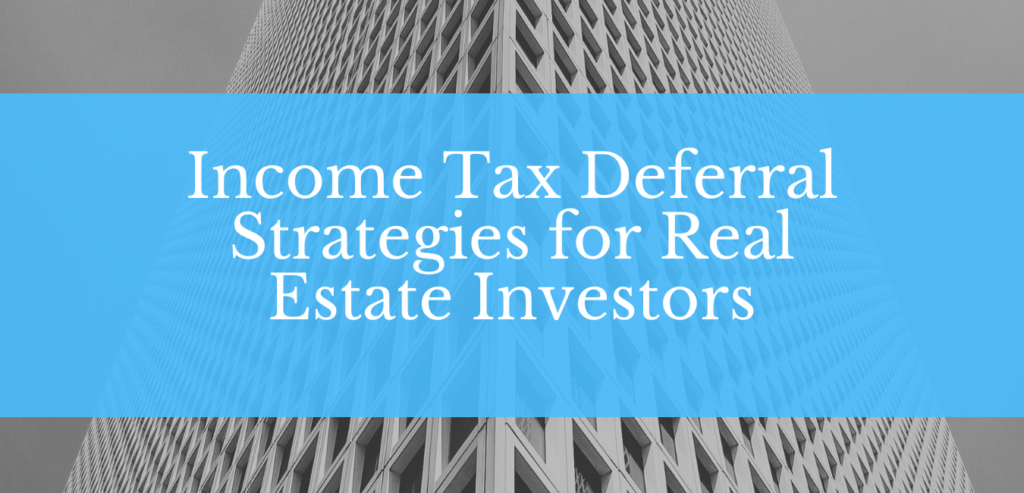Income Tax Deferral Strategies for Real Estate Investors

Income Tax Deferral Strategies for Real Estate Investors
There are a number of significant income tax benefits that are often overlooked by real estate investors that could allow them to defer or exclude some or all of their income tax liabilities on the sale or disposition of their real estate tax deferral assets.
It is important for real estate investors to have at least a working knowledge of the basics in order to identify when a strategy may be applicable. The following is a concise summary of the available strategies that an Investor should discuss with his or her tax advisor.
Section 1031—Tax-Deferred Like-Kind Exchange of Property Held for Rental, Investment or Used In a Business
Section 1031 of the Internal Revenue Code (“1031 exchange”) provides that real property held for rental property tax deductions, investment or use in a business (“relinquished property”) can be exchanged for “like-kind” real property also held for rental, investment or use in a business (“replacement property”) allowing the Investor to defer his or her Federal, and in most cases, state rental income tax rate liabilities.
It is important to note that 1031 exchange transactions are tax-deferred exchanges — not tax-free exchanges — as many authors and advisors frequently refer to them. The Investor’s capital gain and depreciation recapture tax liabilities are merely deferred — and can be continually and indefinitely deferred — into like-kind replacement properties acquired as part of a series of 1031 exchange transactions.
The tax deferral benefits of the 1031 exchange allow an Investor to sell, dispose or convert real property without reducing his or her cash position by paying capital gain or depreciation recapture taxes. This provides the Investor with the continued liquidity necessary to increase his or her real estate portfolio by trading up in value and ultimately increasing his or her net worth by improving cash flow and capital appreciation from the portfolio.
A Qualified Intermediary is required when completing a 1031 exchange transaction. Section 1031 of the Internal Revenue Code applies to personal property as well as real property.
Section 1033—Involuntary Conversion (Disposition) of Property through Eminent Domain (Condemnation) or Natural Disaster
Section 1033 of the Internal Revenue Code (“1033 Exchange”) provides that real property that is or will be the subject of a compulsory or involuntary conversion either from an Eminent Domain proceeding (condemnation by local, state or Federal government) or destruction by an act of God such as an earthquake, hurricane, fire, or other natural disaster, in whole or in part, can be exchanged on a tax-deferred basis for “like-kind” real property that is similar or related in service or use to the property that was involuntarily converted.
Owners have up to two (2) years to replace property destroyed due to acts of God and up to three (3) years to replace property converted due to Eminent Domain proceedings.
A Qualified Intermediary is not required when completing a 1033 Exchange transaction.
Section 1034—Rollover of Gain from the Sale of a Primary Residence (Repealed)
Section 1034 of the Internal Revenue Code (“1034 Exchange”) was repealed and replaced by Section 121 of the Internal Revenue Code. However, it is important to understand what Section 1034 was all about, what changed with the repeal of this Section and what the differences are between the old and new laws.
Section 1034 of the Internal Revenue Code allowed an owner of real property that was used as his or her primary residence to sell or otherwise dispose of the primary residence and defer 100% of his or her capital gain tax liability by acquiring another primary residence of equal or greater value.
Qualified Intermediaries were not required for Section 1034 exchange transactions.
Section 721—Tax-Deferred Exchange of Property Held for Rental, Investment or Use in a Business Into A Real Estate Investment Trust (REIT)
Section 721 of the Internal Revenue Code (“721 Exchange”) allows an Investor to exchange rental property tax deductible Investors typically utilize the upREIT in conjunction with selling relinquished property and acquiring like-kind replacement property pursuant to Section 1031 of the Internal Revenue Code.
Once the replacement property has been held as how much is rental income taxed or investment property for 12 to 18 months or more in order to demonstrate the Investors intent to hold the property and qualify for 1031 exchange treatment, the replacement property is contributed into a Real Estate Investment Trust (REIT) in exchange for shares of stock in the Real Estate CPA Investment Trust (REIT) pursuant to Section 721 of the Internal Revenue Code.or investment real estate for shares in a Real Estate Investment Trust (REIT). This is called a 721 exchange — also known as an up REIT or 1031/721 exchange.
The 721 exchange does not have to be in conjunction with a 1031 exchange, however. The Investor could simply contribute rental or investment property already owned by the Investor directly into the Real Estate Investment Trust (REIT) as part of a 721 exchange.
The 721 exchange can provide an Investor with a great exit strategy by exchanging out of his or her investment real estate portfolio and into shares of a Real Estate Investment Trust (REIT) that should provide more liquidity once the Real Estate Investment Trust (REIT) becomes publicly traded and listed on a securities exchange. The Investor also gains complete control and flexibility over the recognition of the capital gain tax by determining the timing and the number of shares sold in the Real Estate Investment Trust (REIT).
However, the 721 exchange essentially eliminates the ability for the Investor to exchange back into real estate and defer his or her capital gain taxes by using a 1031 exchange because the Investor now owns securities instead of a real estate interest.
Section 121—Exclusion of Capital Gain on the Sale of Primary Residence
Due to the recent housing stimulus package, tax-free gains from the exclusion of a primary residence will now be more limited. (1/29/2009)
The Taxpayer Relief Act of 1997 repealed and replaced the tax deferral provisions contained within Section 1034 of the Internal Revenue Code with a capital gain exclusion provision pursuant to Section 121 of the Internal Revenue Code (“121 Exclusion”).
Generally, a Taxpayer can sell real property held and used as his or her primary residence and exclude from gross income up to $250,000 in capital gain taxes if the Taxpayer is single and up to $500,000 in capital gain taxes if the Taxpayer is married and filing a joint income tax return. The Taxpayer is required to have lived in the real property as his or her primary residence for at least 24 months out of the last 60 months (two out of the last five years). The 24 months do not need to be consecutive and there are certain exceptions to the 24-month requirement when a change of employment, health, or other unforeseen circumstances has occurred.
Section 121 is effective for dispositions of real property held as a primary residence after May 7, 1997. Taxpayers can complete a 121 exclusion once every two (2) years.
Taxpayers should carefully monitor the amount of “
built-up” capital gain in their primary residence and may want to seriously consider selling their primary residence before the capital gain tax liability exceeds the $250,000 or $500,000 limitation. The Taxpayer’s capital gain tax liability in excess of these exclusion limitations will be taxable. A sale of the primary residence would preserve the tax-free exclusion of the capital gain and would allow the Taxpayer to acquire another primary residence and start all over again.
Special legal, tax and financial planning are needed in circumstances where a Taxpayer already has a significant capital gain tax liability in excess of the $250,000 or $500,000 exclusion limitation. For example, the primary residence could be converted to rental or investment property tax property and then sold as part of a 1031 exchange after it has been rented for a sufficient amount of time in order to demonstrate the Investor’s intent to hold the property as rental or investment property. This would allow the Taxpayer to dispose of his or her primary residence, defer all of the capital gain tax liability, and diversify and allocate the capital gain tax liability probably over a number of rental properties clearing the way for further financial, tax and estate planning opportunities.
There are special rules applicable to real property acquired initially as replacement property through a 1031 exchange transaction and then subsequently converted to the Taxpayer’s primary residence and sold pursuant to Section 121 of the Internal Revenue Code.
William L. Exeter is President and Chief Executive Officer of Exeter 1031 Exchange Services, LLC. Mr. Exeter has been in the financial services industry since 1980 and entered the tax-deferred like-kind exchange services industry in 1986. He has written and lectured extensively on tax-deferred like-kind exchange transactions pursuant to Section 1031 of the Internal Revenue Code and on Tenant-In-Common (TIC) Properties as like-kind replacement property solutions.
We hope you found this article about “Income Tax Deferral Strategies for Real Estate Investors” helpful. If you have questions or need expert tax or family office advice that’s refreshingly objective (we never sell investments), please contact us or visit our Family office page or our website at www.GROCO.com. Unfortunately, we no longer give advice to other tax professionals gratis.
To receive our free newsletter, contact us here.
Subscribe our YouTube Channel for more updates.

Alan Olsen, is the Host of the American Dreams Show and the Managing Partner of GROCO.com. GROCO is a premier family office and tax advisory firm located in the San Francisco Bay area serving clients all over the world.
Alan L. Olsen, CPA, Wikipedia Bio

GROCO.com is a proud sponsor of The American Dreams Show.

The American Dreams show was the brainchild of Alan Olsen, CPA, MBA. It was originally created to fill a specific need; often inexperienced entrepreneurs lacked basic information about raising capital and how to successfully start a business.
Alan sincerely wanted to respond to the many requests from aspiring entrepreneurs asking for the information and introductions they needed. But he had to find a way to help in which his venture capital clients and friends would not mind.
The American Dreams show became the solution, first as a radio show and now with YouTube videos as well. Always respectful of interview guest’s time, he’s able to give access to individuals information and inspiration previously inaccessible to the first-time entrepreneurs who need it most.
They can listen to venture capitalists and successful business people explain first-hand, how they got to where they are, how to start a company, how to overcome challenges, how they see the future evolving, opportunities, work-life balance and so much more..
American Dreams discusses many topics from some of the world’s most successful individuals about their secrets to life’s success. Topics from guest have included:
Creating purpose in life / Building a foundation for their life / Solving problems / Finding fulfillment through philanthropy and service / Becoming self-reliant / Enhancing effective leadership / Balancing family and work…

MyPaths.com (Also sponsored by GROCO) provides free access to content and world-class entrepreneurs, influencers and thought leaders’ personal success stories. To help you find your path in life to true, sustainable success & happiness. It’s mission statement:
In an increasingly complex and difficult world, we hope to help you find your personal path in life and build a strong foundation by learning how others found success and happiness. True and sustainable success and happiness are different for each one of us but possible, often despite significant challenges.
Our mission at MyPaths.com is to provide resources and firsthand accounts of how others found their paths in life, so you can do the same.
Regenerative Medicine and Creating Health with Dr. David Haase
Dr. David Haase, Founder of the MaxWell Clinic discusses regenerative medicine and creating health on Alan Olsen‘s American Dreams Show. Transcript: Alan Olsen Welcome to American Dreams. My guest today is David Haase. David, welcome to the show. David Haase Thanks, Alan. Alan Olsen So do you have a remarkable background and career obviously that…
VC Success With Silicon Valley Veteran Andrew Romans
Andrew Romans, General Partner of 7BC Venture Capital, Author, and University Professor discusses navigating Silicon Valley, venture capital (VC), startup success, and the future of tech investment on Alan Olsen‘s American Dreams Show. Transcript: Alan Olsen Welcome to American Dreams. My guest today is Andrew Romans. Andrew, welcome to today’s show. Andrew Romans Thank you so…
How Entrepreneurs Shine With Gino Wickman
Gino Wickman, Founder of EOS Worldwide and author of “Shine” and “Traction: Get a Grip on Your Business” discusses How to shine as an Entrepreneur on Alan Olsen‘s American Dreams Show. Transcript: Alan Olsen Hi, this is Alan Olsen and welcome to American Dreams. My guest today is Gino Wickman. To welcome to today’s show. Gino…




